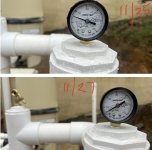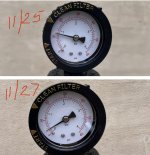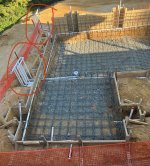Hi All! Posting here for saving my sanity! And hopefully to get some responses to help me and any others with this issue down the road!
Our pool builder ran the pool internals and stub outs for the pool months ago - capped and pressure tested them holding at 25psi with no leaks for month +
We have 3 pumps the main pool pump attached to the filter/ returns is not staying pressurized And one of the water feature pumps is not staying pressurized either. The 3rd pump IS holding the air through the whole line from pad to the pool.
The pool builder response to this was “This is very normal when pressuring with air. There are many unions on the system. Unfortunately we can’t pressure with water because of the weather.”
I’ve looked around through some threads and I’m confident that since this is a closed system it shouldn’t be leaking!? Water or air tested.. and should stay pressurized within 2-3psi to account for temp changes? Could anyone shed some insight if I’m mistaken and should I hold the PB accountable to come figure out where these leaks are? As you can see within 2-3 days the gauges are down to zero PSI.
Look forward to any help and insight anyone can provide on this!!
Thank you so much!!
Our pool builder ran the pool internals and stub outs for the pool months ago - capped and pressure tested them holding at 25psi with no leaks for month +
We have 3 pumps the main pool pump attached to the filter/ returns is not staying pressurized And one of the water feature pumps is not staying pressurized either. The 3rd pump IS holding the air through the whole line from pad to the pool.
The pool builder response to this was “This is very normal when pressuring with air. There are many unions on the system. Unfortunately we can’t pressure with water because of the weather.”
I’ve looked around through some threads and I’m confident that since this is a closed system it shouldn’t be leaking!? Water or air tested.. and should stay pressurized within 2-3psi to account for temp changes? Could anyone shed some insight if I’m mistaken and should I hold the PB accountable to come figure out where these leaks are? As you can see within 2-3 days the gauges are down to zero PSI.
Look forward to any help and insight anyone can provide on this!!
Thank you so much!!





